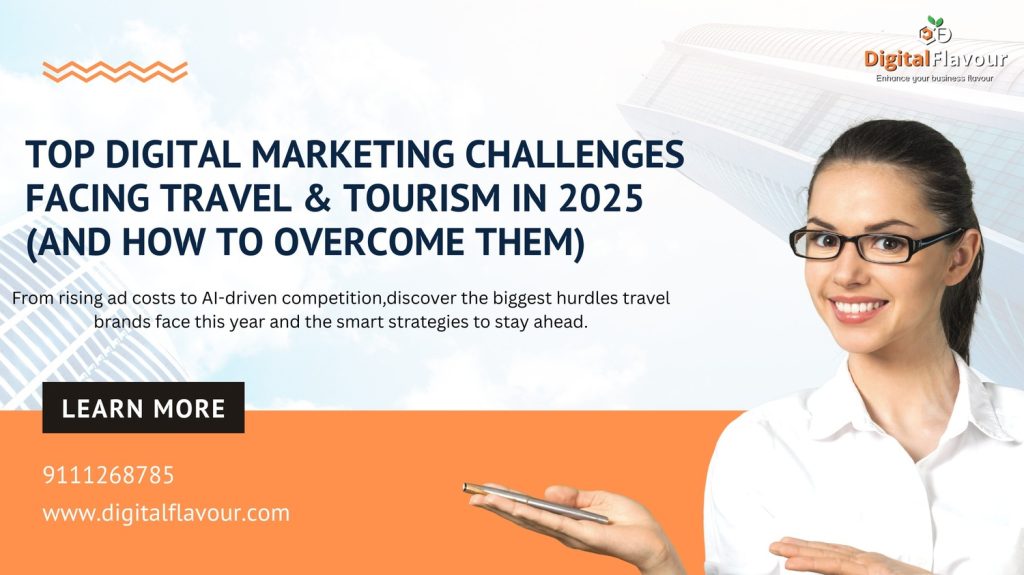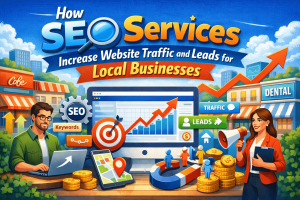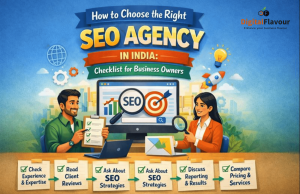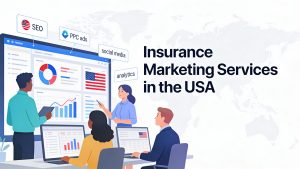The travel and tourism industry is one of the most dynamic sectors, constantly evolving with technology, customer expectations, and global market shifts. In 2025, travelers are more digital-first than ever before planning trips through mobile apps, researching destinations on social media, and relying on online reviews before booking. This shift creates both opportunities and challenges for travel agencies, tour operators, and hospitality brands.
Competition is at an all-time high, as large Online Travel Agencies (OTAs), aggregator platforms, and big hotel chains dominate search results and advertising space. On the other hand, consumer behavior has changed dramatically. Today’s travelers expect personalized experiences, instant responses, and seamless digital interactions. At the same time, emerging technologies like AI, voice search, and machine learning are reshaping how people search, compare, and book travel services.
Against this backdrop, digital marketing is no longer optional for travel and tourism businesses—it’s the key driver of growth, visibility, and customer acquisition.
Table of Contents
ToggleWhy Digital Marketing is Crucial for Travel & Tourism in 2025
The tourism industry has always been influenced by trends, seasons, and consumer preferences, but the way people make travel decisions has shifted drastically in recent years. Here’s why digital marketing has become a non-negotiable strategy in 2025:
- Travelers Are Researching Online First
Over 80% of travelers now start their journey online—through search engines, social media platforms, and review sites. Without a strong online presence, travel agencies risk being invisible to potential customers. - Rise of Mobile-First Travel Planning
Smartphones are the go-to tool for researching destinations, booking flights, and checking itineraries. A mobile-optimized digital marketing strategy ensures that agencies capture customers on the go.
Influence of Reviews and Social Proof
Platforms like TripAdvisor, Google Reviews, and Instagram play a major role in shaping travel decisions. Digital marketing helps brands manage their reputation, showcase reviews, and build trust.
Personalization is the New Norm
Modern travelers expect customized offers and curated experiences. Digital marketing powered by data analytics and AI allows businesses to deliver targeted campaigns that drive engagement and conversions.
Cost-Effective Visibility Against Big Competitors
Competing with OTAs and big players is tough. However, SEO, local marketing, and content strategies give smaller agencies the ability to compete effectively and reach niche audiences without massive advertising budgets.
In short, digital marketing is the bridge between travel businesses and modern travelers. Without it, agencies risk losing relevance, bookings, and brand authority in an increasingly competitive landscape.
Understanding the Travel and Tourism Digital Landscape in 2025
The travel and tourism industry has always adapted to global shifts, but 2025 marks a defining era where digital channels dominate every stage of the traveler’s journey—from inspiration to booking to post-trip sharing. To stay competitive, businesses must understand how consumer behavior, technology, and marketing platforms are shaping the landscape.
Rise of Online Bookings, Reviews, and Mobile-First Travelers
The days of walk-in travel agents and offline bookings are nearly gone. Today, over 70% of travelers prefer to book trips online, with mobile devices leading the way. From flight reservations to hotel check-ins, the smartphone has become a personal travel assistant.
Additionally, reviews and social proof play a decisive role. A recent survey revealed that 95% of travelers read reviews before booking a hotel or tour. Websites like Google, TripAdvisor, and Booking.com influence purchase decisions more than traditional advertising. This makes online reputation management and social media presence essential for travel businesses.
Travelers are also mobile-first in their decision-making. Quick searches like “best resorts near me” or “cheap flights to Bali” are happening on-the-go. This shift means travel brands must invest in mobile-friendly websites, fast-loading pages, and local SEO strategies to capture intent-driven customers.
The Role of AI, Personalization, and Voice Search
Artificial Intelligence (AI) is reshaping how travelers interact with brands. From chatbots handling customer inquiries 24/7 to AI-driven recommendations for destinations, technology is enhancing customer experiences while saving operational costs.
Personalization is now the standard expectation. Travelers no longer want generic packages—they expect curated itineraries, personalized offers, and recommendations based on past behavior. For example, AI-powered marketing tools can suggest family-friendly destinations to parents while targeting solo travelers with adventure trips.
Voice search is another game-changer. With the rise of smart assistants like Alexa, Google Assistant, and Siri, travelers are increasingly searching hands-free: “Find me beach resorts in Goa under $200.” Travel businesses that optimize for voice-friendly, conversational keywords will have a competitive edge in search visibility.
Data Showing Digital Dependency in Travel Planning
Travel is no longer just about destinations—it’s about digital touchpoints. Statistics show:
- 80%+ of travelers use search engines as their first step in trip planning.
- 60% of younger travelers (Gen Z & Millennials) rely on Instagram, TikTok, and YouTube for travel inspiration.
- Over 65% of last-minute bookings are made via mobile devices.
- Online ads and retargeting campaigns influence a large portion of travel purchases, especially for luxury and experience-based trips.
This dependency highlights a critical truth: the success of any travel agency or tourism brand now depends on its digital marketing strategy. Without visibility across search engines, social platforms, and review sites, businesses risk being left out of the traveler’s journey altogether.
The Biggest Digital Marketing Challenges Facing Travel and Tourism Marketing
The travel and tourism industry is full of opportunities, but it also faces unique hurdles when it comes to digital marketing. Below are the biggest challenges travel agencies and tour operators face in 2025—along with practical solutions to overcome them.
1. High Competition in Online Travel Market
The travel industry is one of the most competitive markets online. Large Online Travel Agencies (OTAs) like Expedia, Booking.com, and Trip.com dominate Google’s first page and ad space, leaving small and mid-sized agencies struggling for visibility.
The challenge: Smaller travel businesses often lack the budget to compete with these giants on paid ads, and without a strong SEO strategy, they risk being invisible to travelers.
The solution:
- Invest in SEO and niche targeting-focus on long-tail keywords such as “luxury yoga retreat Bali” instead of broad terms like “Bali trips.”
- Develop destination-specific landing pages to capture search intent.
- Use content marketing-blogs, videos, and guides that position your agency as an authority in your niche.
2. Declining Organic Reach on Social Media
Platforms like Facebook and Instagram have drastically reduced organic reach. With algorithms favoring paid content, it has become increasingly difficult for travel agencies to gain visibility without advertising.
The challenge: Travel content is abundant on social media, making it harder to stand out. Agencies that rely solely on organic posts see limited engagement and fewer leads.
The solution:
- Combine paid social ads with organic strategies.
- Use storytelling and reels to showcase authentic travel experiences.
- Encourage user-generated content (UGC) by running contests, hashtags, or review campaigns—UGC builds trust and boosts engagement.
3. Negative Reviews & Online Reputation Management
In the tourism industry, trust is everything. More than 90% of travelers read online reviews before booking. One negative review, if left unaddressed, can significantly harm your reputation and booking rates.
The challenge: Managing reviews across platforms like Google, TripAdvisor, and social media requires time and consistency—something many small agencies struggle with.
The solution:
- Build a proactive reputation management strategy.
- Respond promptly and professionally to both positive and negative reviews.
- Use monitoring tools to track mentions of your brand and address issues before they escalate.
4. Keeping Up with Changing Algorithms & Technology
Google search updates, social media algorithm changes, and the rise of AI-driven platforms make digital marketing a moving target. For many travel agencies, staying updated is overwhelming.
The challenge: Lack of expertise or resources to adapt quickly often leads to drops in visibility and traffic.
The solution:
- Invest in professional SEO services that monitor updates in real time.
- Focus on continuous optimization of content, ads, and local SEO.
- Partner with digital marketing experts who understand travel-specific trends and platforms.
5. Rising Cost of Paid Advertising
Google Ads and Meta ads (Facebook & Instagram) have become increasingly expensive, with travel-related CPCs (Cost per Click) among the highest across industries.
The challenge: Small agencies often burn through ad budgets quickly without seeing consistent ROI.
The solution:
- Use smart PPC strategies—target long-tail, less competitive keywords.
- Run remarketing campaigns to reach warm leads who have already interacted with your brand.
- Focus on data-driven ad optimization to reduce wasted spend.
6. Personalization & Customer Experience Challenges
Today’s travelers expect highly personalized experiences. Generic travel packages no longer work. However, many agencies lack the tools or data insights to create tailored campaigns.
The challenge: Without personalization, businesses risk losing customers to competitors who deliver customized experiences.
The solution:
- Implement CRM systems to collect and analyze customer data.
- Use email marketing automation to deliver personalized offers.
- Leverage AI-driven personalization tools to recommend destinations and packages based on customer preferences.
7. Content Saturation in Tourism Marketing
With thousands of travel blogs, YouTube vlogs, and Instagram posts published daily, it’s harder than ever for agencies to make their content stand out.
The challenge: Standard “Top 10” blogs and generic destination posts get lost in the noise, attracting little traffic or engagement.
The solution:
- Focus on niche storytelling (e.g., hidden gems, eco-tourism, wellness retreats).
- Create destination guides, itineraries, and insider tips that provide unique value.
- Prioritize video-first content—short-form reels, destination walkthroughs, and customer testimonials.
8. Local SEO & Visibility Issues
Many travelers search using terms like “best travel agency near me” or “tour packages in [city].” Yet, many operators fail to optimize their Google Business Profile (GBP) or build local citations.
The challenge: Without strong local SEO, businesses miss out on high-intent customers ready to book.
The solution:
- Optimize Google Business Profile with updated photos, services, and reviews.
- Build location-based landing pages targeting specific cities or regions.
- Encourage happy customers to leave local reviews that boost visibility in “near me” searches.
Proven Strategies to Overcome Digital Marketing Challenges in Tourism
The good news is that while the travel and tourism industry faces several digital marketing hurdles, there are effective strategies that agencies can adopt to overcome them and drive consistent growth.
1. Data-Driven Marketing (Analytics + Insights)
Successful campaigns are built on insights, not assumptions. By analyzing customer data,search behavior, booking patterns, and engagement metrics,travel businesses can tailor campaigns that resonate with their audience. Tools like Google Analytics, heatmaps, and CRM dashboards help agencies understand what works and what doesn’t.
2. SEO + Content Marketing Tailored for Travel Agencies
SEO remains the backbone of digital visibility. Travel agencies should focus on:
- Destination-based keywords (“best honeymoon packages in Bali”)
- Long-tail searches that capture intent-driven travelers
- Content marketing through blogs, videos, and travel guides that answer real traveler questions
This not only improves search rankings but also builds authority in a competitive market.
3. Omnichannel Approach (SEO, Social Media, Email, PPC)
Modern travelers interact with multiple touchpoints before booking. A single-channel strategy is no longer enough. By combining:
- SEO for long-term visibility
- Social media ads for engagement
- Email marketing for nurturing leads
- PPC campaigns for instant traffic
travel businesses can build an integrated funnel that guides prospects from awareness to conversion.
4. Investing in Automation & AI Tools for Better Customer Targeting
AI-driven tools make personalization easier. From chatbots that answer queries 24/7 to AI-driven recommendations based on past behavior, automation ensures better engagement at scale. Email automation platforms and CRM integrations can segment travelers and deliver tailored offers at the right time.
5. Partnering with Expert Digital Marketing Agencies like Digital Flavour
Not every travel agency has the time or resources to manage complex digital strategies. Partnering with a trusted digital marketing agency like Digital Flavour, Best Digital Marketing Agency ensures access to expert strategies, the latest tools, and scalable campaigns designed specifically for travel and tourism businesses.
Why Travel Agencies Should Outsource Digital Marketing in 2025
Outsourcing digital marketing is becoming a necessity for travel agencies that want to stay competitive without stretching resources thin.
- Saves Time & Cost vs. In-House: Building an in-house team is expensive and time-consuming. Outsourcing gives access to expert talent without overhead costs.
- Access to Latest Tools, Trends & Strategies: Agencies like Digital Flavour stay ahead of Google updates, AI innovations, and ad trends so travel businesses don’t have to.
- Scalable Marketing with Measurable ROI: Campaigns can be scaled up or down based on seasonality and budget, with clear performance metrics.
- Real-World Impact: For example, a boutique travel agency in Sydney saw a 40% increase in bookings within three months of implementing targeted SEO + PPC strategies, proving the ROI of outsourcing.
Final Thoughts
The travel and tourism industry in 2025 faces both immense opportunities and pressing challenges in digital marketing. From high competition and rising ad costs to the demand for personalization and reputation management, travel businesses must evolve their strategies to stay relevant.
The solution lies in data-driven, omnichannel, and personalized marketing approaches that not only improve visibility but also build lasting customer trust.
If you’re a travel agency struggling with these challenges, you don’t have to do it alone.
Digital Flavour specializes in helping travel agencies grow online through SEO, social media, paid ads, and automation. Contact us today for a free consultation and discover how we can help you scale your travel business with confidence.
Author
-

Ragini Neema is the founder & CEO of Digital Flavour, Indore’s leading digital marketing agency helping startups and businesses scale into powerful brands. With expertise in SEO, Social media marketing, paid advertising, and Web development, has positioned Digital Flavour as a trusted growth partner for companies that aim to go big. Recognized as a digital marketing expert, Ragini blends strategy, creativity, and innovation to deliver measurable results in today’s competitive online world.






